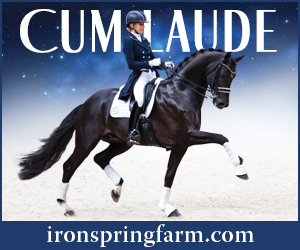In recognition of his contributions to the development and promotion of classical dressage in the US, Charles de Kunffy was inducted into the Roemer Foundation/USDF Hall of Fame in 2013. He has contributed his expertise to various publications and has written numerous published books on dressage. Mr. de Kunffy, one of the most eloquent ambassadors of dressage, has become known as a lifelong educator and charismatic instructor who has had a resounding impact on dressage in America. Here is the induction speech, given by then-USDF President George Williams, when she joined the ranks of the Roemer Foundation/USDF Hall of Fame.
Induction Speech:
Charles de Kunffy may well be one of the most eloquent ambassadors of dressage in our lifetime. He is the author of numerous articles and at last count, seven books on the subject.
The well known British author and horse woman, Sylvia Loch, wrote in the foreword of the 1993 edition of The Ethics and Passions of Dressage: “If you want to express the utter joy, the drive, the energy that takes you forward on your journey with horses, it is here in this book.”
And so it is with all of his writings.
For a man passionate about 17th century European history, art and architecture, and with a love for the symphony and opera, it should come as no surprise that he has a passion for the art of dressage. For us, the dressage community, it is a windfall that he has such an articulate ability to write about the subject.
Since 1984, when he first began his book publishing career, his books have been translated into many different languages.
Charles was born in Hungary, where his parents bred derby winning race horses. Thus, when he started riding as a child at the age of 7, it is easy to say that it was in his blood. By his own account, his riding was always under expert supervision and instruction. This initial start was during the Second World War and then the Hungarian Revolution. In 1952, he was admitted to the Riding Academy in Budapest as the “youngest student ever”.
His riding teachers were the products of many of the riding institutions of Europe, including Vienna and Hanover. Many of his teachers were not only outstanding equestrians; some were high ranking officers with doctorate degrees, authors and scholars. He was taught with a strict adherence to classical training traditions which were based on scholarship and a profound respect for the horse.
“Diversification of activities, riding skills and the ability to improve any horse were emphasized in the academic training program.” Everything was classed as dressage work. Sliding down embankments, jumping triple bars, and galloping fast down forest paths all were necessary extensions of dressage.
In his autobiography, A Rider’s Survival from Tyranny, the reviewer tells us that “Charles retells the dramatic events of his privileged and turbulent young life. A European nobleman in the stormy years of World War II and the Hungarian Revolution persevered to become a prominent equestrian. During the Soviet occupation, he finds a life-saving island of tranquility in the ancient art of classical horsemanship.” Charles writes: “During terrifying and trying years, horses let me escape into a meditative inner peace. They gave me relief from anxiety, unconditional friendship, and affection…When I rode; the world of cares, fears, and hardships fell away. I found myself in a state of great emotional happiness and intellectual well-being.”
Charles came to New York in 1957, graduating from Berkley in 1962. His first career in the US was from 1963 to 1976, as a school teacher, teaching philosophy and psychology in EastBay, outside of San Francisco. In those days, dressage in America was still very much in its infancy.
According to Charles, “I was more or less drafted into dressage in the US”. Horseback riding in America was different from what he was used to seeing in Europe. He began helping some students in the EastBay and it grew from there.
He took a year off from teaching to judge and teach dressage. He then asked for a second year off from teaching. After his two year sabbatical, he decided to leave teaching altogether and focus on teaching dressage and judging.
From those early years, his involvement grew very quickly. He is a long time member of the California Dressage Society. He has conducted clinics, seminars and forums for instructors and judges throughout Europe, Africa, Australia, Canada and the US. In 1993 and 1996 he was the USDF National Symposium presenter.
Charles has written, “Horsemanship is a complex science and when done well, a great art”. He continues to preach this philosophy as one of the Trainers of the British Trust known as, “Training of Teachers of Tomorrow”. This Trust, which includes Stephen Clarke, was founded to uphold the principles of the classical European Traditions and thereby to advance training skills and teaching skills. Charles has said about teaching, “I teach every student as if they are the next Olympic rider. I never talk down to the green or evergreen rider. I honor the art.”
His longtime student, JJ Tate said recently: “Mr. de Kunffy is one of the most absolute classical masters still practicing his art and trade. Anything I have achieved in this sport is a direct reflection of him and his wonderful teachings. To this day, he is still so passionate about dressage.”
Sonja Vracko: “I have known and worked with Charles de Kunffy for over 30 years. We have judged together on many occasions. He is, without a doubt, one of the most knowledgeable and compassionate judges, always thinking of the well being of the horse first. He truly promotes the art of classical dressage at its best.”
Charles claims, “By writing succinctly, I hope to make the Classical Principles of riding and training eloquent.”
Need I say more?
There is no question that his writings and teachings will continue to inspire many more generations of dressage enthusiasts to come. It is my pleasure to induct Charles de Kunffy into the Roemer Foundation/USDF Hall of Fame.
George Williams
USDF President
Listen to the audio of Fireside Chat with Charles to hear his thoughts on Classical Dressage, training, and much more!















